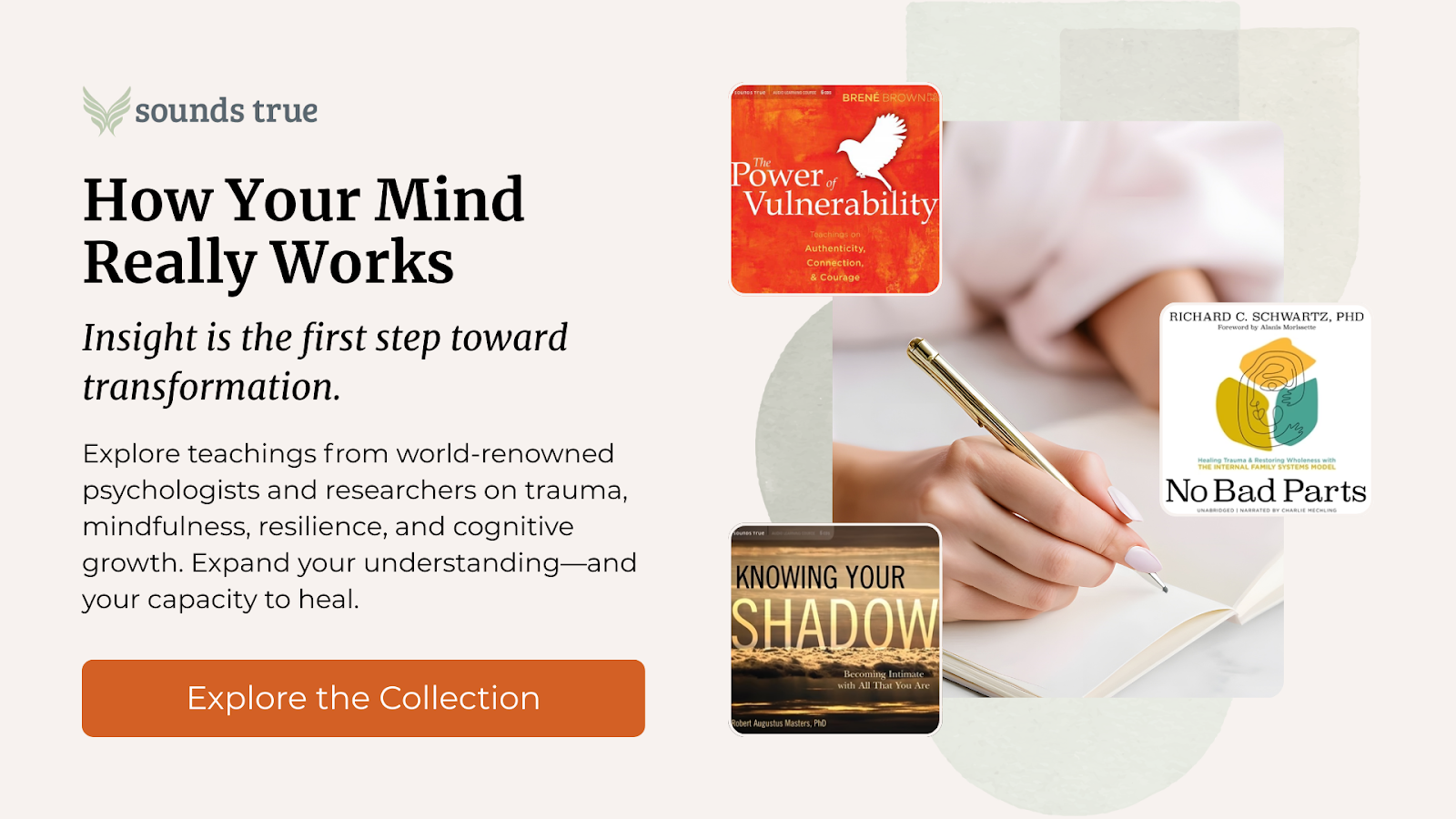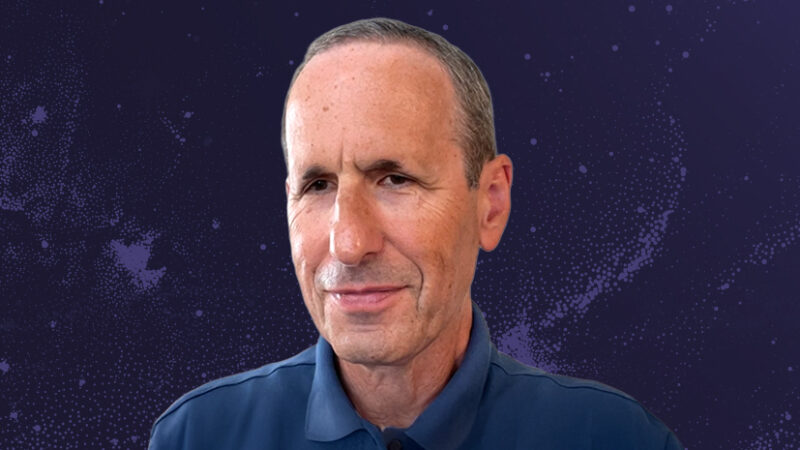Trauma has a way of leaving a mark by quietly shaping how we move through the world, touch joy, and weather pain. For many, it takes the form of upheaval that knocks the ground out from beneath us, or a subtle ache that lingers long after others have moved on. The journey of healing from trauma can feel overwhelming and, at times, incredibly lonely. Yet there is wisdom in remembering you are not alone.
At Sounds True, we’ve made it our mission to share spiritual teachings that illuminate the path from suffering toward wholeness. We believe in meeting pain with heart, honesty, and compassion, leaning into difficult truths while holding fast to hope and inner strength. In this exploration of how to overcome trauma, we’ll draw from timeless spiritual insights and modern approaches, honoring the resilience within each of us.
Key Takeaways:
- Trauma’s Lasting Imprint on Body, Mind, and Spirit: Trauma shows up in physical tension, mental patterns, and spiritual disconnection. Recognizing these imprints is the first step toward healing from trauma.
- Knowing When and Where to Seek Support: Signs like overwhelm, persistent flashbacks, or deep isolation reveal when extra care is needed. True companions in trauma recovery offer empathy, patience, consistency, and safety. A solid support network may include trusted friends who respect boundaries, family members who listen compassionately.
- Mindfulness, Movement, and Somatic Routines That Restore Balance: Gentle practices, breathwork, mindful meditation, and somatic approaches help calm the nervous system and guide you in overcoming traumatic experiences with grounded resilience.

How Trauma Shapes the Body, Mind, and Spirit
Trauma often plants itself deep within us, sending ripples that touch our bodies, thoughts, and sense of meaning. These echoes can become roadblocks that make achieving goals feel daunting and growth seem out of reach. By exploring how trauma affects the body, mind, and spirit, we begin to see why healing from trauma requires patience, compassion, and an integrated approach.
The Body Remembers
Trauma can take root in the body, sparking fight, flight, or freeze responses long after the original event has passed. A racing heart, clenched jaw, or tense shoulders may surface without warning. Fatigue, headaches, and restlessness are also common, as they are physical reminders of the story the body still carries. These signals are not signs of weakness; they are the nervous system’s way of seeking safety. Over time, unaddressed patterns can weigh heavily, making everyday tasks or long-term goals feel nearly impossible.
The Mind Holds the Story
As for the mind, trauma often reshapes the way we see ourselves and the world. Hypervigilance can keep us braced for danger even in safe spaces. At other times, numbness may settle in, leaving us cut off from our feelings. Thoughts can spiral into shame, self-blame, or confusion. These mental loops act like barriers, clouding focus and blocking progress toward the life we long to create. Healing begins when we notice these patterns with curiosity, kindness, and a willingness to practice trauma recovery step by step.
The Spirit Feels the Weight
Trauma can also dim the spirit, shaking our sense of meaning and belonging. Disconnection may show up as a loss of trust in life, difficulty accessing hope, or a lingering feeling of isolation. Spiritual wounds often leave us adrift, as though the light within has gone out. Yet within this pain lies the possibility of rediscovery. By tending to the spirit, we create space for renewal, resilience, and a deeper connection to purpose.
Types of Trauma and Where They Stem From
Trauma does not take a single form, but rather it arises from many experiences, each carrying its own weight and ripple effects. Here are some types of trauma and where they originate from:
- Acute trauma: A single event such as an accident, natural disaster, or sudden loss.
- Chronic trauma: Repeated exposure to distressing experiences like ongoing abuse or neglect.
- Complex trauma: Multiple, layered experiences that compound over time, often in early life.
- Generational trauma: Pain and patterns carried through families and communities across generations.
- Secondary or vicarious trauma: Emotional residue absorbed from witnessing or supporting others in their suffering.
Signs You Might Need Extra Support
Sometimes, despite our best intentions, the journey through trauma leaves us feeling isolated and overwhelmed. Healing is rarely linear, and even the most steadfast hearts sometimes need a guide or a helping hand. But how do you know when to reach outside yourself for extra support? Here are some signs that reaching for extra trauma recovery support may be helpful:
- Daily life feels unmanageable: Struggling with eating, sleeping, or maintaining routines can signal that your system is carrying more than it can process alone.
- Emotions feel unrelenting: Persistent sadness, anxiety, sudden waves of anger, or a lingering sense of numbness may point to unresolved pain seeking acknowledgment.
- Flashbacks and intrusive memories appear: Past experiences may surface vividly, interrupting present-moment focus and draining emotional energy.
- Hopelessness takes hold: A growing belief that life cannot change or that joy feels out of reach often indicates the need for compassionate guidance.
- Trust feels fragile: Difficulty relying on loved ones or believing others have your best interest at heart can deepen feelings of isolation.
- Unhealthy coping becomes a default: Turning to excessive screen time, substance use, or withdrawal from relationships may bring temporary relief but create long-term barriers to growth.
- Connection feels impossible: Even when surrounded by friends or family, a sense of disconnection or shrinking inner world can leave you feeling unseen.

Mindfulness and Meditation to Soothe the Nervous System
When life’s turbulence shakes us, our nervous system can linger in a state of high alert. After trauma, the body remembers. We might feel jumpy, restless, or stuck in spirals of anxiety. This is where mindfulness and meditation offer a gentle refuge. By returning to the present, these practices help soothe the nervous system and create space for resilience.
Returning to Presence Through Mindfulness
Mindfulness is the practice of noticing what is happening here and now without judgment. Instead of forcing the mind to be quiet, mindfulness welcomes each breath, sensation, or thought with gentle awareness. A simple practice might include observing the rise and fall of the breath, or listening to surrounding sounds as they come and go. These small acts of presence remind the nervous system that safety exists in the present moment, easing the grip of fear and helping the body relax.
Meditation as Daily Restoration
Meditation builds on mindfulness by offering structure and repetition. Daily rituals—whether focusing on the breath, practicing loving-kindness, or walking with intention in nature—send steady messages of calm to the body and mind. Even five minutes of stillness can tell the nervous system, “You are safe now.” Over weeks and months, this repeated reassurance creates new patterns of ease and resilience, contributing to the long process of healing from trauma.
Practical Strategies for Soothing the Nervous System
Trauma can make stillness feel impossible at times. On those days, gentle practices help create accessible entry points into mindfulness:
- Grounding through breathwork: Slow, steady inhales and longer exhales remind the body that calm is available.
- Body scans: Bringing attention to each area of the body, from toes to crown, allows hidden tension to surface and soften.
- Loving-kindness meditation: Repeating compassionate phrases toward yourself and others can gradually replace self-criticism with warmth.
- Mindful movement: Walking slowly, practicing yoga, or simply stretching with awareness anchors presence in physical sensation.
- Sensory focus: Engaging with sights, sounds, or textures in the environment creates steady anchors in the present moment.
Building a Compassionate Support Network
The path of healing from trauma often feels heavy, yet connection can ease the weight. A compassionate support network provides steady encouragement, safe presence, and spaces where your voice is honored. These relationships help you take steps forward in trauma recovery, reminding you that resilience grows through shared care.
Who Can Be Part of a Compassionate Support Network
The work of healing from trauma often grows stronger in the presence of safe and caring relationships. For example, friends who listen without judgment, family members who honor your boundaries, and mentors who embody guidance can all help restore a sense of belonging. In these connections, you find people who hold space for your story rather than rushing to fix it.
During trauma recovery, collective spaces such as support groups or spiritual communities can also serve as anchors. Shared rituals, honest conversations, and circles of empathy create reminders that you are not walking the path alone. Professional guidance from therapists and counselors adds another layer of care, bringing compassionate expertise and tools that help you process pain in fruitful ways.
When Compassion Is Missing from Relationships
On the journey of healing from trauma, recognizing who can walk beside you is as vital as noticing who cannot. While many people bring kindness, patience, and steadiness, some may unintentionally add weight to your healing. Some dismiss or minimize your experiences, leaving you feeling unheard. Others pressure you to “move on” before you are ready, or turn the focus back to themselves rather than honoring your story. These dynamics often carry judgment, criticism, or a disregard for the boundaries you need to feel safe.
During trauma recovery, awareness of these patterns matters. By noticing which relationships drain rather than restore, you protect your energy and open more space for trust and resilience. The process of overcoming traumatic experiences involves surrounding yourself with people who create safety rather than erode it, who offer presence instead of pressure, and who remind you through their actions that your healing is worthy of time.

Somatic Approaches That Help Release Stress and Trauma
The body often carries what words cannot express. Tight shoulders, a clenched jaw, or an unsettled chest remind us that trauma leaves traces in our physical form as well as in memory. Somatic practices recognize this truth by inviting the body into the process of healing from trauma. Through gentle attention, movement, and breath, the nervous system can rediscover balance, offering a grounded path forward in trauma recovery.
Everyday Somatic Practices That Restore Balance
Somatic approaches bridge the mind and body through awareness of sensation. Simple routines such as body scanning, slow yoga, or tai chi invite you to notice where tension resides and allow it to soften. Breathwork, with its steady rhythm of inhaling and exhaling, anchors presence and quiets lingering agitation.
Even small gestures like placing a hand over your heart or humming softly can serve as reminders that calm is within reach. Over time, these rituals shift the body from storing pain toward cultivating safety and resilience, helping you continue overcoming traumatic experiences with steadier ground beneath you.
Learning Somatic Wisdom Through Sounds True
For those ready to explore these practices in greater depth, Sounds True offers a wealth of teachings through audiobooks and courses. These resources feature teachers who guide you in somatic routines designed to reconnect body and mind.
From step-by-step instruction in breathwork to explorations of mindful movement, the catalog brings both accessible practices and deeper study into your daily life. With consistent practice, these teachings open the door to a body that feels less like a container for stress and more like a sanctuary for healing. In this way, Sounds True extends compassionate tools for your journey of trauma recovery.
Final Thoughts
Overcoming trauma shouldn’t be about erasing the past or pretending pain never touched your life. Instead, this journey should be about learning to hold your story with tenderness and watching as spirit slowly reshapes wounds into strength. At Sounds True, we have witnessed again and again how resilience rises when pain is met with kindness, curiosity, and courage.
You are never meant to walk this road alone. Wisdom flows from spiritual teachers, trusted friends, and guides who create spaces of safety. With these companions beside you, the process of overcoming traumatic experiences becomes less about carrying a burden and more about uncovering a wellspring of resilience. In this unfolding, a life that feels grounded, heart-led, and true begins to take form.
Read More:
Frequently Asked Questions About Overcoming Trauma
What are the common symptoms of trauma?
Trauma can show up in countless ways, both visible and invisible. You might notice flashbacks, nightmares, or trouble sleeping. Some people feel anxious or on edge, avoiding reminders of what happened, or having frequent mood swings. Others experience physical symptoms like unexplained aches, a racing heart, or stomach distress. Remember, every response is valid, and trauma shapes us all differently.
What is PTSD, and how is it related to trauma?
PTSD, or post-traumatic stress disorder, is a specific diagnosis that can develop after a traumatic event. It’s marked by symptoms like re-experiencing the trauma, intense emotional distress, hypervigilance, and avoidance of triggers. While not everyone who experiences trauma will get PTSD, the two are intimately connected. PTSD offers a clinical lens, but any struggle after trauma is worth honoring and addressing.
Are there self-help strategies for overcoming trauma?
Absolutely. Healing starts with small, gentle steps. Mindful breathing, grounding exercises, movement, and connecting with supportive people can all help. Journaling, spending time in nature, or practicing self-compassion are other powerful tools. You don’t have to climb the mountain in one day. Small acts of self-care can make a transformative difference over time.
What types of therapy are effective for trauma?
Several therapies have been shown to support trauma recovery. Approaches like somatic experiencing, EMDR (Eye Movement Desensitization and Reprocessing), trauma-informed cognitive behavioral therapy (CBT), and Internal Family Systems (IFS) can all be effective. Sometimes, simply being in the presence of a compassionate, skilled therapist. no matter the modality, makes the most impact.
What role does mindfulness play in healing trauma?
Mindfulness gently invites us back into our bodies, one breath at a time. It helps us notice our feelings and sensations with curiosity instead of judgment. Practices like meditation, mindful movement, or even mindful walking can foster safety and presence, making space for healing to unfold gradually and organically.
Can medication help with trauma recovery?
For some, medication can offer relief, especially when symptoms like anxiety or depression feel overbearing. While medication isn’t a cure, it can be a valuable companion alongside therapy and self-care, helping to regulate your nervous system while you rebuild inner strength. Always consult with a caring, qualified provider to explore what’s right for you.
Is it normal to feel numb or disconnected after trauma?
Of course. Feeling numb, detached, or even like you’re outside your own body is a common trauma response. Your mind and body are trying to protect you from pain. Over time, and with the right support, these feelings can soften. Be gentle with yourself; numbness often signals that you’re surviving the best way you know how.
What are healthy ways to express emotions related to trauma?
Validation is the first step, and letting yourself feel whatever arises is brave work. Creative outlets like art, music, or movement can help give shape to complex emotions. Talking with trusted friends, therapists, or support groups can bring connection and relief. Most importantly, honor your own pace, as there’s no right or wrong way to express what you carry.
















